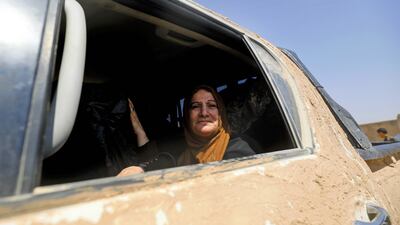Sawsan Karapetyan and her family are among the very few Christians left in Raqqa, living under the brutal rule of ISIL.
On Tuesday, after years of living in fear, she fled, clutching her rosary beads.
The 45-year-old Syrian Armenian and six members of her family left ISIL territory on foot under cover of darkness. They were rescued by Christian fighters who are participating in the battle to oust the extremists from Raqqa and taken to the safety of the western suburb of Jazra in the back of a lorry.
"I didn't want to leave, but there was so much bombardment around us that we fled," said Sawsan, still wearing the black robes which ISIL declared compulsory for all women.
Like many of the thousands who have escaped from ISIL before them, Sawsan and her family took virtually nothing. But Sawsan could not bear to leave behind her rosary or her pet parrots, "Lover" and "Beloved".
"It would have been a shame to leave these birds in Raqqa. I left everything except them," she said.
Read more: About 2,000 ISIL fighters remain in Syria's Raqqa, US envoy says
Squeezed in Raqqa, ISIL extremists ramp up counter-attacks
US-backed Syria force ousts ISIL from half of Raqqa
As she spoke, she sipped tea given to her by soldiers from the Syriac Military Council (SMC), a Christian unit fighting beside the Syrian Democratic Forces, who are supported by the US. Together, they have captured more than half of Raqqa from ISIL since first penetrating the city limits it two months ago. The offensive has ravaged the place, leaving civilians caught in the crossfire of mortar rounds, sniper fire, and air raids by the US-led coalition.
"When Raqqa was bombed, we would gather together to pray to the Lord so things would be calm," Sawsan said, fiddling with her rosary beads.With three female and three male relatives, she left Raqqa at 3am, via an escape route the SMC opened two days ago.
"We have lived through the hardest moments these last three days because of the fierce bombing. I was terrified for my husband and my family."
Once there were thousands of Armenians and Syriac Christians living in Raqqa, making up around one percent of the city's population, which is predominantly Sunni.
Armenians in Syria are the descendants of those who fled mass killings in Anatolia, Turkey at the peak of the First World War in 2015. The Armenians consider the massacre genocide but turkey rejects the term. massacres the Armenians see as a genocide, though Turkey rejects the term.
When ISIL seized Raqqa in 2014, most of the city's Christians fled, along with the Kurdish population. Under ISIL rule, Christians faced the choice of converting to Islam, paying a sectarian tax called jizya, or risking death to escape. It was usual for ISIL to destroy religious symbols and houses of worship, and Sawsan's relative, Alexey, said she had haunting memories of ISIL's oppression of Christians.
"When ISIL entered they burned the churches, all the prayer books, the angels, the statue of the Virgin Mary and of Jesus the Messiah," she said. The city's famed Armenian Catholic Church of the Martyrs and the Greek Catholic Church of Our Lady of the Annunciation were both ravaged by jihadists.
"We used to celebrate our holidays in secret, spending them at home in fear," said Alexey, 50. "We would light a bit of incense just to feel that it was a religious holiday. We all left Raqqa and all of our things stayed behind. It's a painful feeling. We tried to stay but we couldn't take it anymore."
Read more: Heroes of darkness come into the light
Christian communities in the Middle East are vulnerable and afraid
Pope comforts terror victims in Christmas message
From Jazra, she and her relatives planned to head west to Aleppo to be reunited with Armenian family members they lost touch with about a month ago.
Tens of thousands of people have been displaced from Raqqa by the escalating battle. Matay, a 22-year-old Christian fighter, said his forces had secured a route in recent days to help civilians flee.
"We got a Christian family out yesterday... This is our goal in the campaign to liberate Raqa," he said.
Kardij Kirdian, 50, fled on Tuesday, a day after his brother. "I can't describe the feeling when we saw the Christian fighters welcoming us," he said.
At first, he wanted to stay in his native Raqqa, even if it meant paying exorbitant taxes. "The first year, they took 55,000 Syrian pounds (more than $100 or Dh392) per person as jizya. The next year it was 66,000, and this last year it was 166,000 pounds each," Kirdian said.
To afford the levy, he would rent out and farm fertile land around the city.
"Daesh blew up all of the churches, which devastated us. I haven't prayed inside a church since 2013," he said. But he remains hopeful that he will again.
"If we rebuild them, we will pray again in Raqa."

